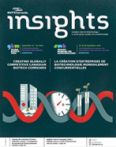Think Globally, Work Virtually: The Future of Biotech Success
Recently, I found myself walking through the halls of a University biotechnology incubator in Florida when the inventor of a novel medical device asked me if I knew of a good device regulatory consultant. I answered that I knew of several, but none in Florida. She seemed disappointed, and said that she wished there were someone local she could talk to. The biotechnology industry is volatile and often resource-limited which makes local, affordable, world-class drug and device expertise difficult to find. The expertise should come from seasoned, collaborative and highly specialized individuals who can tailor their advice to be company and product specific. So I asked myself, in an era of cutting-edge communication technologies, why would it matter where the expertise comes from?
The pool of talented drug and device experts does not have to be limited to your immediate geographic area. Here is a success story of how two teams on opposite sides of the world came together and accomplished a successful, global regulatory filing 6 months earlier than originally expected. When a larger European pharmaceutical company acquired a small but innovative Canadian biotech company, there were concerns as to how the two teams would interact. The virtual team was cross-cultural and there was a 9 hour time difference between them. The Canadian team had a very strong clinical and regulatory development skill set, specializing in drug approvals in the US and Canada, while the European team was excellent in getting over the hurdles of Europe’s EMA. Most of the key team members worked virtually and maintained a positive team dynamic by relying on web-based communication tools for their team discussions. The Canadian and European teams also tag-teamed in their workflow. The Europeans would work their 8 hours on a regulatory submission, while the Canadians would continue another 8 hours after the end of the European work day. In some cases, their colleagues in Asia and Australia continued the work for another 8 hours, in order to complete submissions for certain countries in Asia and Australia. This global work process resulted in a faster, successful global product registration for the European company. The product is now approved in over thirty countries.

The key to virtual team success is solid, strong leadership and the willingness of team members to be flexible. The use of virtual teams may involve adopting a different mind-set on how team members interact with each other, but for talented individuals this is hardly insurmountable. By using virtual teams, companies no longer have to compromise on obtaining quality talent and bringing in new team members now becomes cost-effective.
Given that many new and innovative biotechnology products never make it to market because of deficient development programs, the use of accomplished drug and devise development experts is vital. Obtaining drug and device expertise in a virtual environment may be the key to future success in the ever-changing landscape of biotechnology.



